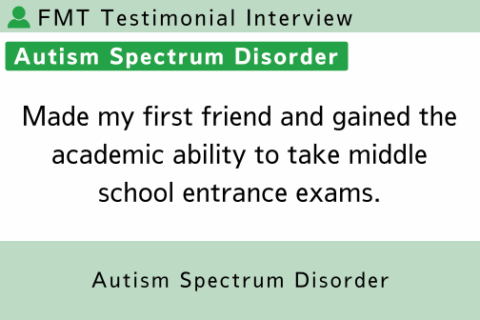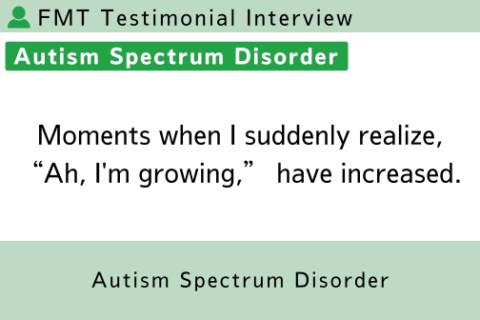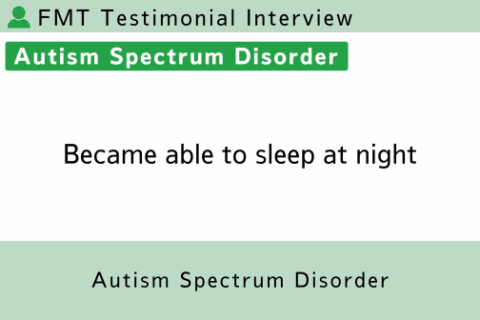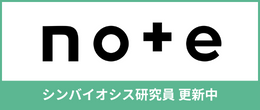Introduction
Mrs. K, a resident of Canada originally from Hong Kong, decided to have her 13-year-old son, who has Autism Spectrum Disorder (ASD), undergo fecal microbiota transplantation (FMT) in Japan. Based on information she gathered from U.S. research and social media, she placed her trust in Japan’s medical care despite living abroad. This article shares Mrs. K’s story—how she discovered NanoGAS®-FMT, what led her to Japan, and the changes she witnessed afterward—a journey many parents may relate to.
Family Profile
- Patient’s Symptoms: Autism Spectrum Disorder (ASD)
- Age/Gender: 13-year-old male
- Residence: Canada (Mrs. K is from Hong Kong)
- FMT Course: 6-session course
- Treatment Facility: Base Clinic Akasaka
Treatment Schedule
| Step | Details | Date |
| Initial | Contact from the family | November 2024 |
| STEP 3 | Application for pre-transplantation support fee | December 2024 |
| STEP 4 | Online interview with a concierge | January 2025 |
| STEP 5 | Online medical examination ① | February 2025 |
| STEP 6 | Arrival in Japan & Face-to-face medical examination | March 2025 |
| STEP 7 | Online medical examination ② | May 2025 |
| STEP 8 | FMT period (2 weeks) | June 23 to July 4, 2025 |
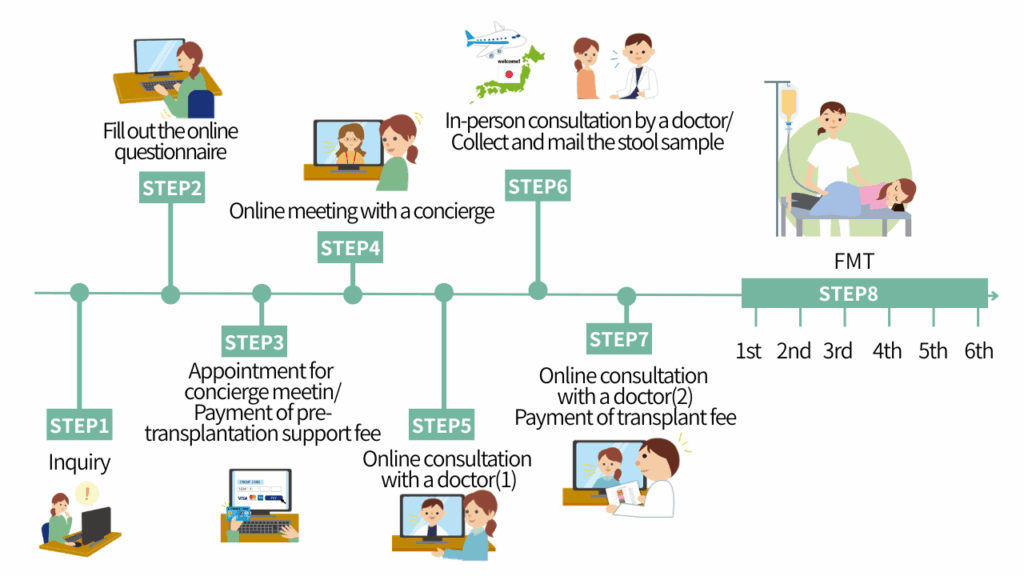
Click here to learn more about the flow of Fecal Microbiota Transplantation (FMT)
Discovering FMT: Information from U.S. Research and Social Media
Mrs. K first learned about FMT through a long-term study conducted at a university in Arizona, USA. The study, which had been ongoing for five to six years, was awaiting approval from the U.S. Food and Drug Administration (FDA). She recalls thinking, “I’ll have my child undergo FMT in the U.S. when he turns 16.”
The turning point came when she saw a post in a global Facebook group for parents. A Japanese man with a serious illness shared that he planned to undergo FMT in Japan. Unfortunately, he passed away before receiving the treatment. But Mrs. K says, “His post became a legacy to me.”
After searching “FMT Japan,” she found a clinic in Osaka. A doctor there introduced her to Shinbiosis Corporation, which ultimately led to her son’s treatment.
Why She Chose Treatment in Japan
Mrs. K’s decision to undergo treatment in Japan was based on her deep trust in the Japanese medical system.
“I’m from Hong Kong, so I’ve always trusted Japanese medical care. When I found out that FMT was available in Japan, I didn’t hesitate.”
Although she knew that capsule-based FMT was available in China, she says, “Once I knew it was available in Japan, I chose it without a second thought.”
She had also contacted a donor bank in Hong Kong but was told that “FMT is not available for children under 18.” This made Japan’s more inclusive system all the more reassuring.
High-quality care, professional communication, and flexibility—all were decisive factors in her choosing Japan.
Pre-Treatment Anxiety and the Reassurance of a Thorough Explanation
Mrs. K’s biggest concern before treatment was, “What if my son refuses it?”
“It’s very hard to help a child with ASD visualize the entire process. A typical child might understand, but not him. His behavior is unpredictable, and I wasn’t confident he wouldn’t get tense, cry, scream, or resist during treatment. I think most parents of children with ASD face the same worries.”
What reassured her was a thorough explanation during the pre-transplant Zoom consultations.
“We were told that even if he wasn’t calm enough to begin the procedure, we could wait an hour for him to settle down. That kind of flexibility was incredibly comforting, especially since we were coming all the way from abroad.”
She adds, “I trusted that the clinic staff would do everything they could to support him. Knowing the medical team understood ASD was a great encouragement and gave me the confidence to move forward.”
Costs, Language, and Payments: Any Concerns from Overseas?
Mrs. K highlights that one of the strongest points of the NanoGAS®-FMT service is its transparent pricing.
“All costs were clearly disclosed—not even one dollar was ambiguous. I had no complaints about the fees.”
Regarding communication:
“They spoke English well, so there were no language barriers. That helped us feel comfortable every step of the way.”
She did encounter a small issue with the initial payment, but this was due to her bank’s system. “Now that I understand how overseas transfers work, I’m sure it will go smoothly next time.”
Post-Treatment Changes: Improved Concentration
There were no dramatic changes immediately after the treatment, but about two months later, she began noticing improvements.
“Before FMT, my son could only focus on his homework for about 45 minutes. Now, he can concentrate for up to 90 minutes.”
His teacher also noticed: “He’s more focused in class now.”
However, emotional fluctuations and mood swings remain mostly unchanged.
“This is my honest, real feedback,” she says.
A Message for Parents with Similar Concerns
The most important message Mrs. K wants to share: “There is hope.”
“The connection between the gut and the brain—the gut-brain axis—is scientifically proven. It’s not a miracle that happens overnight, but my son’s test results improved from Grade D to B. That’s a good sign.”
Even if FMT doesn’t bring a complete cure, improving the microbiome and physical health can lead to long-term quality of life improvements.
“Even if ASD isn’t completely cured, providing my child with better health and a balanced gut microbiome is a gift in itself.”
She also emphasized what she learned: the importance of gut health and nutrition.
“And I hope more parents come to know about the high-quality, reliable medical care available in Japan.”
Imagining a Future Without the Treatment…
When we asked Mrs. K, “What do you think your son’s life would be like without NanoGAS®-FMT?” she answered:
“I think… nothing would’ve improved. His impulsive and aggressive behavior would have worsened. As he grew bigger and stronger, it would’ve become harder to support him. Life would’ve been really tough.”
Mrs. K is a devoted parent who also uses homeopathy and supplements.
Still, she reflects:
“In Canada, it’s really hard to maintain a healthy diet and access the right information. I can’t say for certain, but I’m sure our future would’ve been much harder without NanoGAS®-FMT.”
If You Could Speak to Yourself When You Were Deciding on FMT
A year ago, Mrs. K began considering treatment in Japan and moved forward on the fastest possible timeline.
Now that the journey is behind her, what would she say to her past self?
“That’s life. I have to do it,” she said with a laugh.
Reflecting on the journey, she added:
“I’m truly happy that we received the NanoGAS®-FMT service. This trip to Japan wasn’t just for treatment—we also enjoyed shopping and sightseeing. Everyone from Hong Kong loves Japan.”
Conclusion
Mrs. K’s story is one of hope, trust, and a parent’s unshakable determination.
Our NanoGAS®-FMT service uses our proprietary NanoGAS®-FMT technology, which eliminates the use of antimicrobials, making the treatment gentle on the body.
FMT is available even for children under 18 years old—our youngest patient was just two years old.
If you’re considering NanoGAS®-FMT, please feel free to contact us. English support is available.
Please contact us before reaching out to any medical institution directly.








